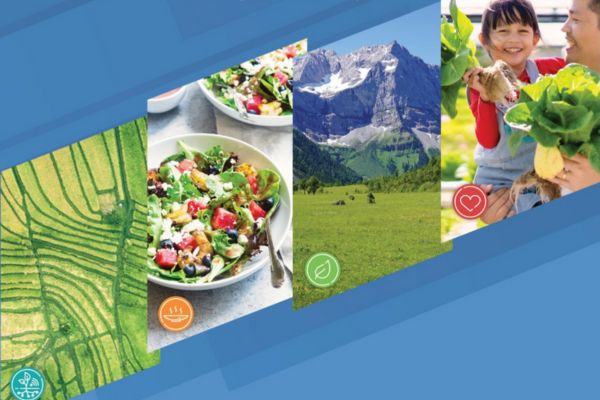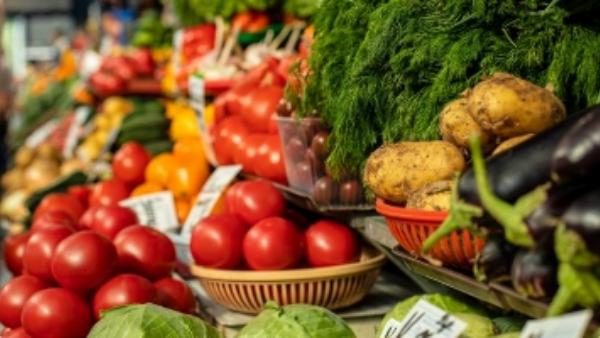Highlights
Director-General

News
Global exhibition “From Seeds to Foods” kicks off FAO’s 80th Anniversary celebrations
The free public exhibition at Rome’s Park of Porta Capena showcases technologies, good practices and the diversity of global agrifood systems from 10 to 13 October


Director-General advocates for sustainable livestock sector at FAO Livestock Week
“When good practices are adopted, livestock systems can be truly sustainable”

Interactive story
Avian influenza: inside the fight against a global threat
Discover how we are helping countries tackle an unprecedented crisis.

In Focus
World Food Forum 2025
Follow this year’s flagship event and discover how youth action, science and innovation, and investment can shape a better food future.

In Focus
FAO response to global food security challenges
Data analyses, policy recommendations, and actions on the ground.

In Focus
A transformative partnership
See how, together, the European Union and FAO are leveraging innovative approaches that benefit the global community.

In Focus
Stories from the Field for Better Foods and a Better Future
As we mark FAO’s 80th anniversary, we are launching a special series of stories that inspire change.

In Focus
Discover the FAO Museum and Network (MuNe)
Explore how this new global initiative will bring together cultures, innovation and knowledge to highlight the power of agrifood systems in advancing sustainable development.
Director-General

Director-General advocates for sustainable livestock sector at FAO Livestock Week
“When good practices are adopted, livestock systems can be truly sustainable”
Join the conversation
Voices of Impact
Buzzing with Purpose: Beekeeping for a New Generation in Türkiye
06/10/2025
In rural Düzce, Türkiye, where forests and biodiversity abound, many young people leave for city jobs. But 22-year-old Züleyha chose a different path: beekeeping. With training and determination, she’s turning hives into hope. Watch the video to see how an FAO project is nurturing a new generation of beekeepers, empowering women and youth, boosting production, and expanding market opportunities.
Video
Hand in Hand for Better Foods and a Better Future
01/10/2025
Join us to grow a peaceful, sustainable and bright future for all.
Podcast
World Food Day 2025 - Public Service Announcement
26/09/2025
What is food? Food is life. Food is memory, roots, land, and the knowledge of our ancestors. Food is a right, not a privilege. Eighty years ago, the world made a promise to grow, share, feed communities and live better through food. This World Food Day, October 16, let’s all walk together hand in hand. Honour traditions. Cultivate innovation. Harvest a better future. To leave no one behind.
Data
FAO Food Price Index 2022-2025
2020 World
31.2%
2010 World
31.5%
In depth

In Focus
Discover the enhanced FAO Transparency Portal
Explore new dashboards on programme, budget and HR, alongside updated project data, for deeper insights into how we work.

Publication
Medium Term Plan and Programme of Work
The Director-General’s Medium Term Plan 2026-29 and Programme of Work and Budget 2026-27.

In Focus
FAO Data Lab
The FAO Data Lab for Statistical Innovation modernizes the statistical business process, with a specific focus on emergency contexts, when having access to timely information is very important.
FAO and the SDGs
Hover the mouse over an SDG icon for more information
A world free from hunger and malnutrition where food and agriculture contributes to improving the living standards of all

FAO works with governments and partners to empower some of the world’s most marginalized people to end rural poverty.

FAO helps ensure food security by developing ways of growing food that will work in the future so that millions of people don’t go hungry.

Good health starts with nutrition. FAO sets global standards and works with governments and the private sector to ensure food quality and safety throughout the food chain.

FAO invests in educational systems for rural communities and supports improved access to primary education and school meals in order to create equal opportunities for all and chances of lifelong learning.

FAO supports gender equality in the agricultural sector in an effort to raise levels of nutrition in local communities and improve agricultural productivity.

FAO works with governments to ensure water use in agriculture is made more efficient, equitable and environmentally friendly.

FAO promotes the use of renewable energies and works to ensure access to modern energy services across the food chain.

FAO seeks better economic opportunities for all by investing in sustainable agricultural practices and food systems that reduce inequalities and create decent jobs.

FAO seeks to secure a future for rural communities via investments in transportation, irrigation, food storage facilities and communication technologies.

FAO works with countries and partners to generate employment in rural areas, ensure access to natural resources for the most vulnerable and connect farmers to markets.

FAO works to improve urban healthcare, water quality and rethink city region food systems to help deter the negative effects of sprawling urbanisation.

FAO coordinates major global initiatives and projects to tackle food waste and loss, partnering with international organisations, the private sector and civil society.

FAO supports countries in responding to the threats of climate change by providing advice, data and tools for better agricultural policies and practices.

FAO, in partnership with governments and fishing communities, implements best practices in fisheries to ensure our oceans are protected as a means of livelihoods.

FAO promotes sustainable approaches to natural resource management and supports endeavours that promote a balance between conservation and development initiatives.

FAO plays a critical role in peacebuilding, restoring rural livelihoods, building resilience and participatory approaches to policymaking.

FAO acts as a neutral policymaking forum and develops partnerships with all concerned with food and agriculture to ensure a world free from hunger.

















Discover the Globally Important Agricultural Heritage Systems (GIAHS)
Story Map
Earthquake in Afghanistan, 31 August 2025
Understanding the impact on agricultural livelihoods




